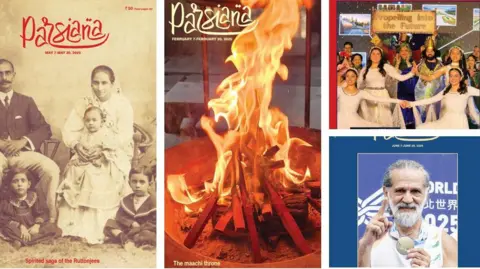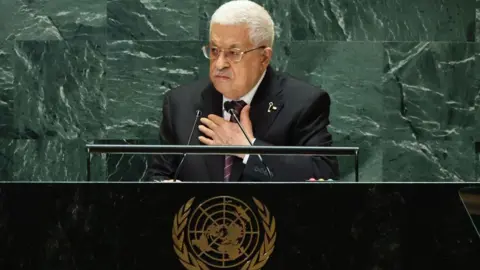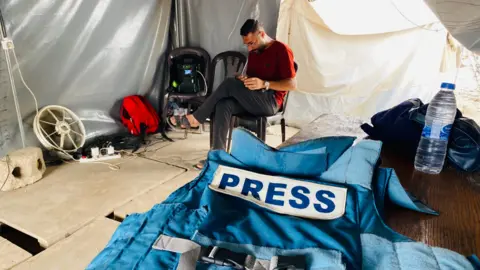When Anuparna Roy accepted the Orizzonti Award for her debut film 'Songs of Forgotten Trees' in Venice earlier this month, she forged a victory that's rare for most women of her background. Trembling with joy and unable to hold back tears, Roy's visceral display of emotion on stage demonstrated how big the moment was - scripting history as the first Indian director to win in a category especially devoted to new voices in independent world cinema.
That itself is a towering achievement, but Roy's grassroots origins in a nondescript tribal village in West Bengal state's Purulia district - thousands of miles from Venice's glamorous palazzos - makes her triumph even more meaningful.
From Ritwik Ghatak to Satyajit Ray to Mrinal Sen, Bengal has produced many globally celebrated auteurs. But unlike them, Roy, 31, grew up far away from the elite cultural influences of Kolkata and took a path more well-worn by small-town Indians - a college degree followed by a call-centre job. It was an escape route from the pressures of marrying and 'a means to economic stability,' Roy told me over a Zoom chat. But it ended up becoming much more.
While peddling IT software in Delhi, a chance meeting with film students triggered a love affair with cinema, and Roy saved every penny earned over the next six years to self-fund her debut short 'Run to the River.' After moving to Mumbai a few years later, she tracked down Ranjan Singh, the lead producer of 'Songs of Forgotten Trees,' at a party and asked him bluntly: 'Sir, would you like to produce a third-world film?'
Taken aback by her boldness, Singh asked Roy to meet him the following day and narrate the idea in less than 10 minutes. The meeting lasted well over a few hours, and within days he had agreed to fund the project. A hardcore fan of Anurag Kashyap's operatic crime-drama 'Gangs of Wasseypur,' Roy persuaded Singh to show the film to Kashyap, who ended up backing it.
Set in the pulsating heart of Mumbai, 'Songs of Forgotten Trees' tells the story of two women from entirely different worlds - Thooya, an aspiring actress who moonlights as an escort, and Swetha, a fellow migrant with a call centre job. They live together in the upscale apartment of Thooya's sugar daddy. What begins as a living arrangement quickly transforms into an intimate relationship between the two women as they navigate same-sex desire and shared experiences of marginality and survival in an urban sprawl.
The film was praised for its depiction of survival among women, with one review describing it as an 'anguished portrait' of their struggle. Aware of her unconventional filmmaking techniques, Roy deliberately avoided traditional rules and instead focused on capturing the characters' rhythms authentically with continuous takes.
Roy infused her roots and political stance during her historic moment at Venice. She wore a traditional handloom saree featuring Palestinian flag colors, promoting dialogue on global issues. When asked about making commercial films, Roy firmly stated, 'I can't make sugar-coated cinema. I have to make films that represent the world we live in, even if they upset people.'
That itself is a towering achievement, but Roy's grassroots origins in a nondescript tribal village in West Bengal state's Purulia district - thousands of miles from Venice's glamorous palazzos - makes her triumph even more meaningful.
From Ritwik Ghatak to Satyajit Ray to Mrinal Sen, Bengal has produced many globally celebrated auteurs. But unlike them, Roy, 31, grew up far away from the elite cultural influences of Kolkata and took a path more well-worn by small-town Indians - a college degree followed by a call-centre job. It was an escape route from the pressures of marrying and 'a means to economic stability,' Roy told me over a Zoom chat. But it ended up becoming much more.
While peddling IT software in Delhi, a chance meeting with film students triggered a love affair with cinema, and Roy saved every penny earned over the next six years to self-fund her debut short 'Run to the River.' After moving to Mumbai a few years later, she tracked down Ranjan Singh, the lead producer of 'Songs of Forgotten Trees,' at a party and asked him bluntly: 'Sir, would you like to produce a third-world film?'
Taken aback by her boldness, Singh asked Roy to meet him the following day and narrate the idea in less than 10 minutes. The meeting lasted well over a few hours, and within days he had agreed to fund the project. A hardcore fan of Anurag Kashyap's operatic crime-drama 'Gangs of Wasseypur,' Roy persuaded Singh to show the film to Kashyap, who ended up backing it.
Set in the pulsating heart of Mumbai, 'Songs of Forgotten Trees' tells the story of two women from entirely different worlds - Thooya, an aspiring actress who moonlights as an escort, and Swetha, a fellow migrant with a call centre job. They live together in the upscale apartment of Thooya's sugar daddy. What begins as a living arrangement quickly transforms into an intimate relationship between the two women as they navigate same-sex desire and shared experiences of marginality and survival in an urban sprawl.
The film was praised for its depiction of survival among women, with one review describing it as an 'anguished portrait' of their struggle. Aware of her unconventional filmmaking techniques, Roy deliberately avoided traditional rules and instead focused on capturing the characters' rhythms authentically with continuous takes.
Roy infused her roots and political stance during her historic moment at Venice. She wore a traditional handloom saree featuring Palestinian flag colors, promoting dialogue on global issues. When asked about making commercial films, Roy firmly stated, 'I can't make sugar-coated cinema. I have to make films that represent the world we live in, even if they upset people.'




















